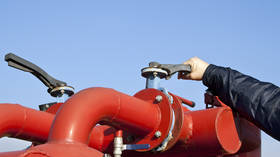US Treasury boss identifies side effects of sanctions against Russia

US sanctions against Russia are having a “huge” impact on the rising food and energy prices at home, Treasury Secretary Janet Yellen has conceded.
Yellen was asked during the New York Times’ DealBook DC Policy Forum on Thursday if already soaring US gas prices would continue to increase.
“It’s unlikely that gas prices are going to fall anytime soon,” Yellen replied.
She later added that the issue is tied to global oil prices, which have also been rising. “Europe is trying very hard to free themselves from dependence on Russian oil, and our sanctions on Russia… are making a huge difference to food and energy prices,” Yellen said.
“I think our sanctions have been remarkably effective. But we continue to tighten them, and oil prices could go further [up].”
She said that the growth of the US economy will slow, “but there’s nothing to suggest that a recession is in the works.”
Yellen’s comments came two days after she told the Senate that the US has been experiencing “unacceptable levels” of inflation.
Many countries, including the US and EU member states, have imposed embargoes on Moscow since Russia launched its military operation in Ukraine in late February.
The White House banned Russian oil in March, while the EU promised to phase out Russian gas by 2030 and, last week, banned deliveries of Russian oil by sea. Hungary and other countries whose economies are heavily dependent on Russian energy have been allowed to continue receiving Russian oil via pipelines.
Speaking to reporters in March, US President Joe Biden dubbed the high gas prices in the country “the Putin price hike,” referring to the Russian leader.
Russia attacked the neighboring state in late February, following Ukraine’s failure to implement the terms of the Minsk agreements, first signed in 2014, and Moscow’s eventual recognition of the Donbass republics of Donetsk and Lugansk. The German- and French-brokered protocols were designed to give the breakaway regions special status within the Ukrainian state.
The Kremlin has since demanded that Ukraine officially declare itself a neutral country that will never join the US-led NATO military bloc. Kiev insists the Russian offensive was completely unprovoked and has denied claims it was planning to retake the two republics by force.












